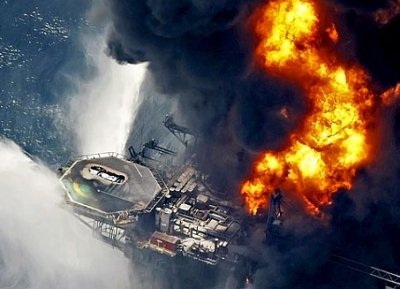 By Jon Bowermaster
By Jon Bowermaster
We are in the process of finishing a big, beautiful, provocative film about Southern Louisiana, focused on the relationship between man and the sea … so obviously when the Deepwater Horizon oil rig exploded, inflamed, sank and now continues to pump oil into the Gulf of Mexico we are watching with a vested interest.
(In our film – current Governor Bobby Jindal is on camera telling an interviewer that one of the “beauties” of Louisiana is that are no oil spills…)
One of the conservation activists we profile in the film, Tracy Kuhns, is the Louisiana Bayoukeeper – affiliated with the international Waterkeeper Alliance – as well as running the Fishing Community Family Support Center. Her husband, Michael Roberts, is a fisherman and they live on Bayou Barataria where fishing is down for multiple reasons, one being the waste left behind by oil and gas explorations and takings going back many decades.
I asked her for her take on the still-growing oil spill in the Gulf, now spreading through Louisiana’s fertile fishing grounds (40 percent of the US.’s seafood comes from the Gulf of Mexico):
Tracy Kuhns: “As a resident of one of Louisiana’s many coastal fishing communities, I am very worried and saddened, right now, about the massive, on going, oil spill in the Gulf of Mexico. The media, government agencies and naturally, the environmental community seem so wrapped up with the oil they can see on the surface, it’s as if, that is all there is to the spill. While dealing with what is seen on the surface if urgent and extremely important to minimizing damage to our estuaries, our fishermen know from experience, with inland and other offshore oil spills, that what is on the surface is nothing compared to what will cover the water bottom and can not be seen.
They know that after everyone proclaims the clean up to be complete and the fishermen go back fishing, their nets will come up covered in oil tar and that they will not be able to fish, in the area of the spill, for years to come.
A complete clean up never happens, so this oil spill is bound to have long term impacts on the Gulf of Mexico and Inland fisheries for years to come, (Approx. 90% of Gulf Marine Species spend some portion of their life cycle in our estuaries). What will it take for us to learn that oil and gas are not worth the long term costs to the environment, communities and the people of the Gulf Coast? Why do we accept coastal destruction and erosion, oilfield debris, oil and gas explosions, spills and pollution as a necessary trade for jobs?
Why are we willing to trade sustainable local seafood, tourism and recreational jobs for destructive, polluting ones? When will our legislators begin to move towards bringing us jobs from clean energy development (solar, etc), rather then hanging on to the past and continuing to support social and environmental destruction in the name of the economy?
Jobs that promote sustainable, local small businesses and communities rather then pushing forward with industrialization of seafood production, which will cause further environmental destruction, fish population decline, and the collapse of local coastal community economies. Have we not learned anything from the industrialization of our farming communities and the resulting environmental and social destruction? Dead Zone in the Gulf and the loss of family farms and communities. Jobs where we produce and build what we need, locally, rather then importing it from elsewhere.
When will those, who claim to serve the people, stand up for us, our communities and our natural resources, rather then corporate interests and environmental and social devastation?”
This article originally appeared in the blog Notes from Sea Level.
